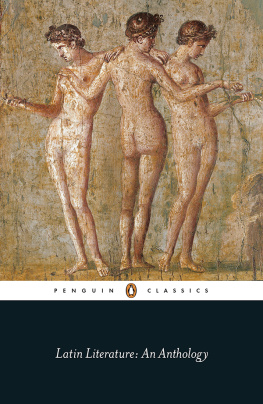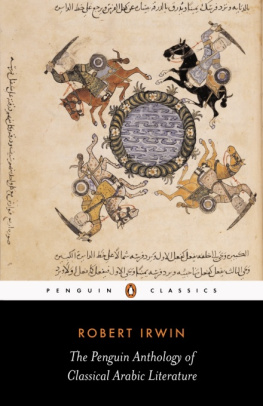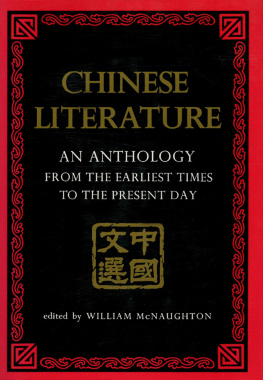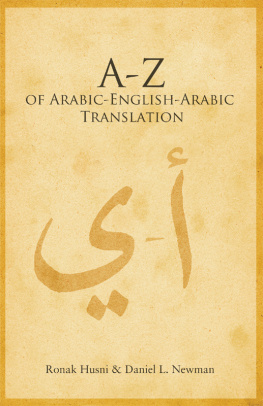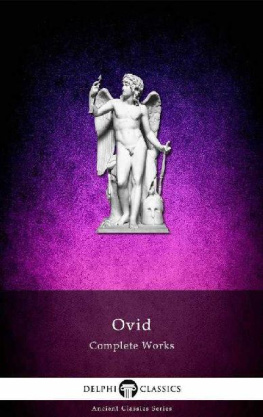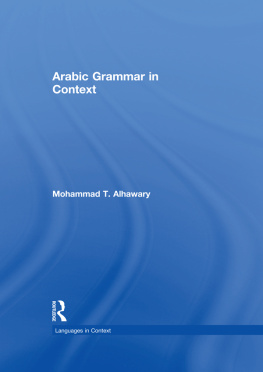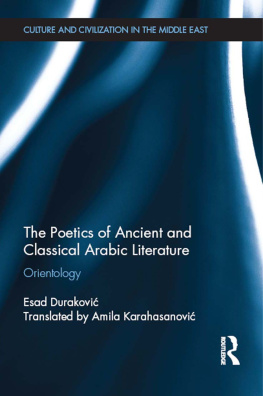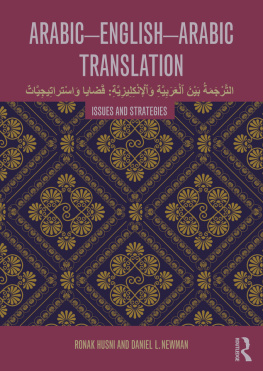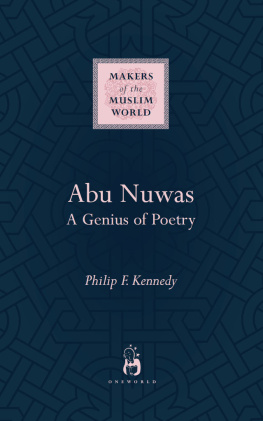Thank you for buying this ebook, published by NYU Press.
Sign up for our e-newsletters to receive information about forthcoming books, special discounts, and more!
Sign Up!
About NYU Press
A publisher of original scholarship since its founding in 1916, New York University Press Produces more than 100 new books each year, with a backlist of 3,000 titles in print. Working across the humanities and social sciences, NYU Press has award-winning lists in sociology, law, cultural and American studies, religion, American history, anthropology, politics, criminology, media and communication, literary studies, and psychology.
Classical Arabic Literature
LIBRARY OF ARABIC LITERATURE
EDITORIAL BOARD
GENERAL EDITOR
Philip F. Kennedy, New York University
EXECUTIVE EDITORS
James E. Montgomery, University of Cambridge
Shawkat M. Toorawa, Cornell University
EDITORS
Julia Bray, University of Oxford
Michael Cooperson, University of California, Los Angeles
Joseph E. Lowry, University of Pennsylvania
Tahera Qutbuddin, University of Chicago
Devin J. Stewart, Emory University
MANAGING EDITOR
Chip Rossetti
VOLUME EDITOR
Philip F. Kennedy
Letter from the General Editor
The Library of Arabic Literature is a new series offering Arabic editions and English translations of key works of classical and premodern Arabic literature, as well as anthologies and thematic readers. Books in the series are edited and translated by distinguished scholars of Arabic and Islamic studies, and are published in parallel-text format with Arabic and English on facing pages. The Library of Arabic Literature includes texts from the pre-Islamic era to the cusp of the modern period, and will encompass a wide range of genres, including poetry, poetics, fiction, religion, philosophy, law, science, history, and historiography.
Supported by a grant from the New York University Abu Dhabi Institute, and established in partnership with NYU Press, the Library of Arabic Literature produces authoritative Arabic editions and modern, lucid English translations, with the goal of introducing the Arabic literary heritage to scholars and students, as well as to a general audience of readers.
Philip F. Kennedy
General Editor, Library of Arabic Literature

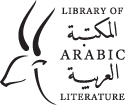
Classical Arabic Literature
A Library of Arabic Literature Anthology
selected and translated by
GEERT JAN VAN GELDER

NEW YORK UNIVERSITY PRESS
New York and London
Copyright 2013 by New York University
All rights reserved
Library of Congress Cataloging-in-Publication Data
Classical Arabic literature : a library of Arabic literature anthology /
selected and translated by Geert Jan van Gelder.
p. cm. (Library of Arabic Literature)
Includes bibliographical references and index.
ISBN 978-0-8147-7027-6 (cl : alk. paper) ISBN 978-0-8147-3826-9 (pb : alk. paper)
ISBN 978-0-8147-4511-3 (e-book) ISBN 978-0-8147-7120-4 (e-book)
1. Arabic literatureTranslations into English. I. Gelder, G. J. H. van
PJ7694.E1C53 2012
892.708dc23
2012030086
CIP
New York University Press books are printed on acid-free paper, and their binding materials are chosen for strength and durability.
Series design by Titus Nemeth.
Typeset in Tasmeem, using DecoType Naskh and Emiri.
Typesetting and digitization by Stuart Brown.
Manufactured in the United States of America
c 10 9 8 7 6 5 4 3 2 1
p 10 9 8 7 6 5 4 3 2 1
Table of Contents
Acknowledgements
I am greatly indebted to the editors of the Library of Arabic Literature for accepting this anthology in the series, as a kind of hors duvre or meze (for it is not a regular volume consisting of the edition and translation of one particular work). That only one name appears on the title page is misleading: in a real sense this anthology is a collective effort. The translations were made over a number of years, in the course of which I must have consulted many colleagues and students about particular points, and I apologize to them if I have forgotten the details. In the later stages I received very many useful suggestions and corrections from various sides, notably from an anonymous non-Arabist reader and the three LAL editors, Philip Kennedy, James Montgomery, and Shawkat Toorawa. The last-mentioned, especially, made heroic efforts to polish my English. I have accepted, with deep gratitude, the great majority of all their suggestions, while stubbornly sticking to my own versions, or making new ones, when I believed them to be more faithful to the Arabic original, or when I rejected a suggestion for metrical reasons (like the Arabs, I prefer poetry that has some kind of meter).
Oxford, March 2012
Abbreviations
ABL | Julia Ashtiany et al., ed. Abbasid Belles Lettres The Cambridge History of Arabic Literature. Cambridge, New York: Cambridge University Press, 1990. |
ALUP | A. F. L. Beeston et al., ed. Arabic Literature to the End of the Umayyad Period The Cambridge History of Arabic Literature. Cambridge, New York: Cambridge University Press, 1983. |
b. | born; (in names) ibn son (of) |
bt. | (in names) ibnat or bint daughter (of) |
ca. | circa |
d. | died |
EAL | Julie Scott Meisami and Paul Starkey, ed. Encyclopedia of Arabic Literature. London: Routledge, 1998. |
EI2 | The Encyclopaedia of Islam, New[= Second] Edition (11 vols. with Supplement vol. and Index vol.). Leiden: Brill, 19602009. |
fl. | floruit |
H | (in dates) Hijr, Muslim calendar |
PCP | Roger Allen and D. S. Richards, ed. Arabic Literature in the Post-Classical Period. Cambridge History of Arabic Literature, Cambridge. New York: Cambridge University Press, 2006. |
r. | ruled |
Q | Quran |
Introduction
Many ancient Arabic Bedouin or quasi-Bedouin poems begin with the exclamation khallayya, My two friends! According to a literary convention, never fully explained, the poet, who is supposed to be traveling in the desert when he spots a place that reminds him of past pleasures, asks two companions to sympathize with his feelings of loss, or at least to wait for him until he has poured out his elegiac verse. The poet, or rather his persona, does not keep his private feelings to himself, silently or soliloquizing: he must have an audience. Whether the feelings are real or imagined, whether the two companions are real or fictional (their names are never given), all this does not matter. The poem must be heard, and its emotions understood and recognized, not only by the anonymous friends but by everyone. The past love affair is the theme of the beginning of the poem only, which moves on to other things, present or future: the description of the poets trusty camel, the desert, tribal matters, feuds and loyalties, patrons or enemies, or anything else that is on the poets mind.
Next page

